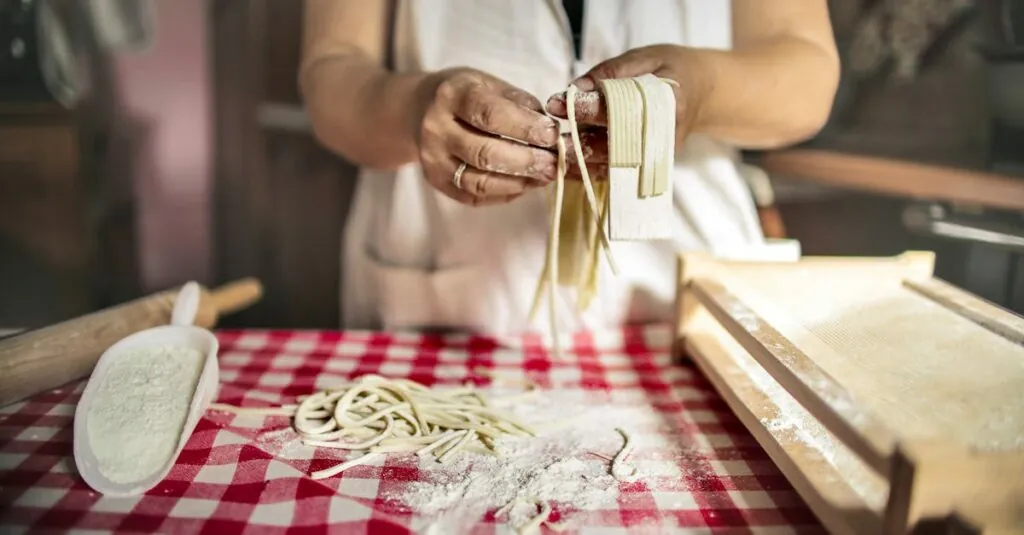Table of Contents
ToggleItalian family traditions are like a delicious plate of pasta—rich, comforting, and often served with a side of laughter. These customs have been passed down through generations, creating bonds that are as strong as Nonna’s secret tomato sauce. From Sunday dinners that could feed an army to festive celebrations that last long into the night, these traditions offer a glimpse into a culture that values family above all else.
Overview of Italian Family Traditions
Italian family traditions represent a vital part of cultural identity. Families often gather for Sunday dinners, where homemade meals create a nurturing environment. Recipes passed through generations include classic dishes like lasagna and risotto, highlighting culinary heritage. Celebrations during holidays, such as Christmas and Easter, involve special foods and gatherings, reflecting the importance of family unity.
Festive occasions typically bring extended family together. Grandparents play a crucial role, sharing stories and wisdom with younger generations. Rituals, such as baptism and weddings, showcase vibrant customs that bind families closer. Participants engage in traditional dances and music, enhancing the celebratory atmosphere.
Familial relationships focus deeply on respect and support. Loyalty defines interactions, with relatives offering assistance during difficult times. Values instilled in children prioritize family commitment and community ties. Grandchildren often learn Italian language and traditions from grandparents, ensuring cultural continuity.
Community events also reinforce family ties. Local festivals invite family participation, creating shared experiences. Church activities may unite families, emphasizing religious faith as an integral part of Italian life. Volunteering during these events fosters connections among families and neighbors.
Overall, Italian family traditions illustrate the profound importance placed on familial bonds and shared customs. These practices create a sense of belonging, preserving cultural heritage while adapting to modern influences. Each gathering strengthens relationships and celebrates the joy of family life.
Key Elements of Italian Family Life
Italian family life centers around close-knit relationships and shared experiences. These elements foster a strong sense of unity and belonging.
The Importance of Family Bonds
Family bonds rank high in Italian culture. They serve as the foundation for emotional support and stability. Celebrations, such as Sunday dinners, create opportunities for family to connect and strengthen ties. Loyalty remains essential, with family members offering help during challenging times. By sharing stories and traditions, grandparents pass down values to younger generations. These practices nurture familial loyalty and support. Annual festivals further highlight the significance of family.
Roles within the Family Structure
Traditionally, the Italian family structure involves distinct roles. Fathers often act as primary providers, while mothers focus on nurturing the home. Children learn responsibilities early, contributing to household tasks. Grandparents hold respected status, becoming caregivers and advisors. Each family member plays a unique role that reinforces interconnectedness. This structure emphasizes respect, kindness, and dedication to family. Additionally, extended family provides a broader support network, enhancing the sense of community.
Celebrations and Rituals
Italian family celebrations and rituals are vibrant occasions that enhance bonds among relatives. Observances revolve around shared meals and traditional practices that strengthen cultural ties.
Holiday Traditions
Christmas and Easter top the list of significant holidays in Italy. Families gather to prepare special dishes like rabbit for Easter and panettone for Christmas. These meals feature prominently during the celebrations, fostering a sense of togetherness. The tradition of lighting candles represents hope and unity during these festive times. Special masses and religious events highlight the importance of faith in family life. Each holiday draws families closer, as they reminisce and create lasting memories.
Life Cycle Events
Life cycle events mark essential milestones in Italian culture. Baptisms, confirmations, weddings, and funerals serve as key gatherings for family members. Baptisms feature godparents playing vital roles in religious commitment, while weddings blend personal vows with community support. Funerals bring families together to honor lost loved ones, emphasizing respect and remembrance. These events prioritize connections and reflect the enduring bonds that define Italian families. Each celebration, significant or solemn, reinforces the importance of familial unity and cultural heritage.
Culinary Traditions
Italian culinary traditions play a vital role in family life, representing a tapestry of flavors and connections. Recipes shared across generations form the heart of these customs.
Family Recipes Passed Down
Family recipes often hold deep sentimental value. Lasagna, risotto, and other regional specialties showcase the unique flavors of Italy. Grandparents frequently pass down these beloved dishes, instilling a sense of heritage in younger generations. New cooks learn techniques and secrets from their elders, ensuring these recipes endure. Consistency in preparation promotes family pride and togetherness during meal times. Each dish tells a story, emphasizing the importance of culinary traditions in strengthening family bonds.
Meal Times as Family Gatherings
Meal times serve as essential gatherings for Italian families. Sunday dinners, for instance, create lasting memories and a sense of belonging. Shared meals encourage lively conversations, allowing family members to connect and share updates on their lives. Extended families often join these gatherings, reinforcing strong relationships through food and laughter. While feasting on hearty meals, families embrace warmth and unity, turning each meal into a cherished ritual. Celebrations during holidays further enhance this experience, transforming meal times into significant family affairs rich with cultural significance.
Modern Influences on Italian Family Traditions
Modern influences are reshaping traditional Italian family customs. These transformations reflect societal changes, with evolving family dynamics playing a key role.
Changes in Family Dynamics
Shifts in family structures emerge as many Italian households adapt to contemporary lifestyles. Fewer families consist of extended members, leading to smaller, nuclear units. Responsibilities often shift, with both parents balancing work and home life, impacting traditional roles. This evolution prompts families to find new ways to connect, emphasizing quality time over quantity. Children engage in extracurricular activities, resulting in busy schedules. Those changes create challenges for maintaining longstanding traditions, yet the essence of family remains. Families prioritize shared experiences, accepting that adaptation is essential for survival.
Globalization and Its Impact
Globalization influences Italian customs significantly, introducing diverse traditions and practices. Exposure to other cultures fosters interest in new cuisines and festivities, blending with traditional Italian values. Many families adopt hybrid celebrations, incorporating international elements into established rituals. Technology facilitates communication, connecting family members across borders, thus strengthening ties despite physical distance. As younger generations embrace global cultures, they reinterpret customs to suit modern lifestyles, ensuring relevance. This influence doesn’t diminish the importance of traditional values, but rather enriches them, creating a unique cultural tapestry. Families navigate an evolving landscape, where ancient traditions coexist with contemporary practices, shaping a dynamic Italian identity.
Italian family traditions serve as a cornerstone of cultural identity and unity. These customs not only foster strong familial bonds but also create a nurturing environment where values are instilled and memories are cherished. The emphasis on shared meals and celebrations highlights the importance of togetherness, while the role of extended family enriches these experiences.
As modern influences shape family dynamics, Italian families continue to adapt while preserving the essence of their traditions. The blend of old and new ensures that the spirit of Italian culture remains vibrant, allowing future generations to appreciate their rich heritage. Ultimately, these enduring traditions reflect the heart of Italian life, reinforcing the significance of family in an ever-changing world.







